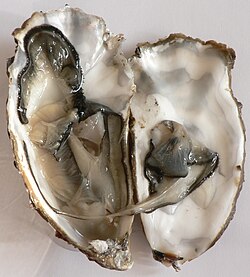austere
Appearance
English
[edit]Etymology
[edit]From Ancient Greek αὐστηρός (austērós, “bitter, harsh, astringent”), having the specific meaning “making the tongue dry” (originally used of fruits, wines), related to αὔω (aúō, “to singe”), αὖος (aûos, “dry”).
Pronunciation
[edit]- (Received Pronunciation) IPA(key): /ɒˈstɪə(ɹ)/, /ɔːˈstɪə(ɹ)/
- (General American) IPA(key): /ɔˈstiɹ/, enPR: ôstēr′
- (cot–caught merger) IPA(key): /ɑˈstiɹ/
Audio (US): (file) - Rhymes: -ɪə(ɹ)
Adjective
[edit]austere (comparative austerer or more austere, superlative austerest or most austere)
- Grim or severe in manner or appearance.
- Synonyms: stern, strict, forbidding, ascetic; see also Thesaurus:stern
- The headmistress was an austere old woman.
- Lacking decoration; trivial; not extravagant or gaudy.
- Synonyms: simple, plain, unadorned, unembellished; see also Thesaurus:unadorned
- Antonyms: overwrought, flamboyant, extravagant, gaudy, flashy; see also Thesaurus:gaudy
- The interior of the church was as austere as the parishioners were dour.
- Adhering to the economic policy of austerity.
- 2024 December 14, Reece Martin, “Learning from Melbourne’s Level Crossing Removal Project” (9:05 from the start), in RMTransit[1]:
- Counterintuitively, in an effort to be austere and save money, cities which only remove a crossing every couple of years manage to be way less efficient at it than Melbourne has been.
Derived terms
[edit]Translations
[edit]grim, stern, strict
|
not extravagant
|
Italian
[edit]Pronunciation
[edit]Adjective
[edit]austere
Latin
[edit]Pronunciation
[edit]- (Classical Latin) IPA(key): /au̯sˈteː.re/, [äu̯s̠ˈt̪eːrɛ]
- (modern Italianate Ecclesiastical) IPA(key): /au̯sˈte.re/, [äu̯sˈt̪ɛːre]
Adjective
[edit]austēre
References
[edit]- “austere”, in Charlton T. Lewis and Charles Short (1879) A Latin Dictionary, Oxford: Clarendon Press
- “austere”, in Charlton T. Lewis (1891) An Elementary Latin Dictionary, New York: Harper & Brothers
Latvian
[edit]
Etymology
[edit](This etymology is missing or incomplete. Please add to it, or discuss it at the Etymology scriptorium.) Perhaps related to Ancient Greek ὄστρεον (óstreon).
Pronunciation
[edit]Audio: (file)
Noun
[edit]austere f (5th declension)
- oyster (certain edible bivalve mollusks of the order Ostreida)
- austeru zveja ― oyster fishing
- rīt austeres ― to swallow oysters
- austeru lasītāji un lasītājas tur brida kailām kājām ― male and female oyster collectors were wading there (= in shallow water) barefoot
Declension
[edit]| singular | plural | |
|---|---|---|
| nominative | austere | austeres |
| genitive | austeres | austeru |
| dative | austerei | austerēm |
| accusative | austeri | austeres |
| instrumental | austeri | austerēm |
| locative | austerē | austerēs |
| vocative | austere | austeres |
Middle French
[edit]Etymology
[edit]Adjective
[edit]austere m or f (plural austeres)
Old French
[edit]Alternative forms
[edit]Etymology
[edit]Adjective
[edit]austere m (oblique and nominative feminine singular austere)
Categories:
- English terms derived from Ancient Greek
- English 2-syllable words
- English terms with IPA pronunciation
- English terms with audio pronunciation
- Rhymes:English/ɪə(ɹ)
- Rhymes:English/ɪə(ɹ)/2 syllables
- English lemmas
- English adjectives
- English terms with usage examples
- English terms with quotations
- Italian 3-syllable words
- Italian terms with IPA pronunciation
- Rhymes:Italian/ɛre
- Rhymes:Italian/ɛre/3 syllables
- Italian non-lemma forms
- Italian adjective forms
- Latin 3-syllable words
- Latin terms with IPA pronunciation
- Latin non-lemma forms
- Latin adjective forms
- Latvian terms with audio pronunciation
- Latvian lemmas
- Latvian nouns
- Latvian feminine nouns
- Latvian terms with usage examples
- Latvian fifth declension nouns
- Latvian noun forms
- Latvian non-alternating fifth declension nouns
- lv:Bivalves
- lv:Seafood
- Middle French terms borrowed from Latin
- Middle French terms derived from Latin
- Middle French lemmas
- Middle French adjectives
- Old French terms borrowed from Latin
- Old French terms derived from Latin
- Old French lemmas
- Old French adjectives

